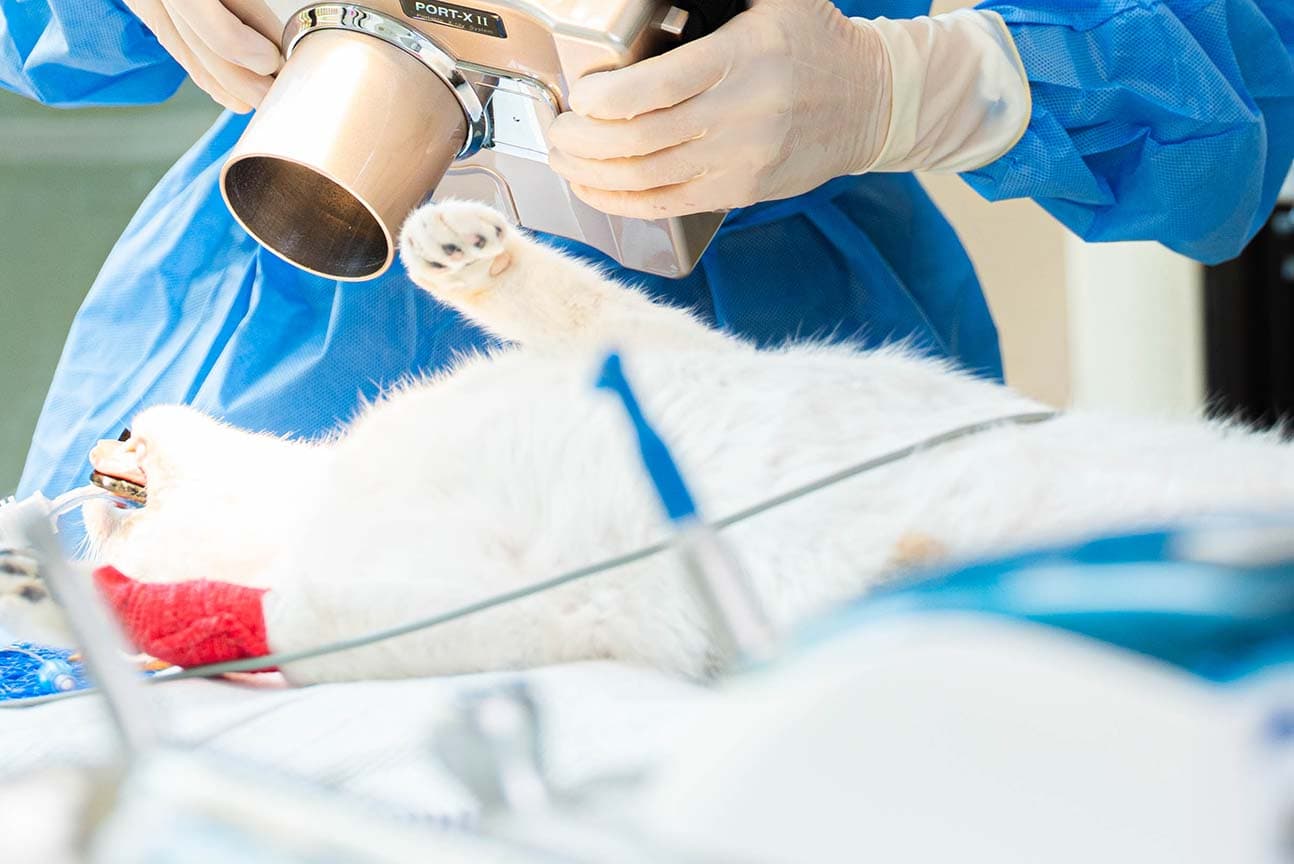Reviewed by Dr. Ramona Jazopolo
Updated on 19/09/2025
Reading time 4 min.
Overview
Severity: Low
Life stage: All
If you are considering castration for your male cat, it’s normal to have questions and concerns about the procedure. Making the decision requires weighing the benefits against the understandable worry of subjecting your cat to surgery.
In Dubai, there are additional factors to consider, including the climate and local regulations affecting pet care. This guide provides essential information about cat castration, helping you make an informed decision that supports your cat’s health and well-being.
What Is Cat Castration?
Cat castration, also called neutering, is a routine surgical procedure where the testicles are removed. It’s performed under general anaesthetic, which means your cat is asleep and will not feel any pain.
Castration is one of the most commonly performed procedures in veterinary medicine worldwide. Our team at Modern Vet performs castrations regularly with excellent outcomes. Most cats recover remarkably quickly and are back to their normal, playful selves within a few days.
Why Consider Castration for Your Cat?
There are many benefits of castration, including preventing unwanted kittens. This is especially important in major cities like Dubai, where responsible pet ownership plays a role in the well-being of the community and its animals.
Health Benefits
- Removes the risk of testicular cancer. Once the testicles are removed, your cat cannot develop testicular cancer, which can be aggressive in intact males.
- May help prevent some infections and injuries: Castrated cats are less likely to roam or fight, reducing exposure to infectious diseases (like FIV or FeLV) and trauma.
Behavioural Benefits
- Eliminates strong-smelling urine spraying. This is particularly important in apartment living, where this can become a serious problem with neighbours and landlords.
- Decreases aggressive behaviour towards other cats, making multi-cat households more peaceful.
Dubai-Specific Considerations
Dubai Municipality requires all cats to be registered and microchipped. Many housing compounds, serviced apartments, and hotels prefer or require neutered pets.
When Should You Castrate Your Cat?
Most veterinarians recommend castrating male cats between 4 and 6 months old. However, cats can be safely castrated at any age.
Early castration (4-5 months) prevents the development of undesirable behaviours, such as spraying. Later castration is also perfectly safe, though it may take longer for certain behavioural patterns to fade.
In Dubai’s climate, many cat owners prefer organising the procedure during cooler months (November to March) when recovery is more comfortable, though our air-conditioned facilities make year-round surgery perfectly safe.
The Castration Procedure: What to Expect
Understanding the process helps relieve those pre-surgery nerves that every cat parent experiences.
Before Surgery
Organise a pre-operative consultation to get your cat thoroughly examined and discuss any concerns you might have. You’ll receive detailed pre-surgery instructions.
During Surgery
The procedure usually takes 20 to 30 minutes. Your cat receives a general anaesthetic and is carefully monitored throughout. A small incision is made over each testicle, and then they are removed. Stitches or skin glue are sometimes used to close the incisions.
After Surgery
Most cats can go home the same day, though some may stay overnight for observation if there are any complications. You’ll receive comprehensive aftercare instructions tailored specifically for Dubai’s environment.
Post-Surgery Care in Dubai’s Climate
Dubai’s warm climate requires special attention during your cat’s recovery period. The recovery period for a routine castration is generally 7 days, though this may vary based on your cat’s age and individual healing process.
The first 24-48 hours
- Keep your cat indoors in air conditioning. The heat can increase swelling and discomfort, so a consistently cool environment improves healing.
- Create a quiet recovery space away from other pets and distractions. A spare bedroom with soft bedding works perfectly.
- Monitor your cat closely for any signs of excessive licking, swelling, or unusual discharge from the surgical area.
- Offer small amounts of food and water once your cat is fully awake. Don’t worry if their appetite is reduced for the first day; this is completely normal.
Days 3-7 post-surgery
- Prevent licking and scratching of the surgical area. An e-collar may be necessary, though many cats heal well without one.
- Keep activity levels as low as possible. This includes no jumping on high furniture or rough play.
Dubai Climate Considerations
- Avoid balcony access during recovery, as the heat and direct sunlight can be harmful to healing tissue.
- Monitor for excessive panting, which could indicate overheating.
- Ensure constant access to fresh, cool water, as air conditioning can be dehydrating.
Managing Weight After Castration
With a balanced diet and regular play, neutered cats can maintain a healthy weight and stay active. Many become even more affectionate and playful once hormonal distractions are reduced.
However, hormonal changes after neutering can affect metabolism, making weight gain more likely. In Dubai’s predominantly indoor environment, monitoring diet and encouraging exercise are especially important.
- Adjust food portions accordingly and monitor your cat’s body condition regularly.
- Encourage play and exercise with interactive toys, laser pointers, and climbing trees.
- Consider switching to a neutered cat food, which has adjusted protein and fat levels for altered metabolism.
Concerned about your cat’s weight? Our vets at Modern Vet can help with expert advice on maintaining a healthy weight and preventing obesity.
Cost and Practical Considerations
Castration costs in Dubai vary based on your cat’s size, age, and any additional services required. At Modern Vet, we provide transparent pricing and detailed estimates during your consultation.
Consider this an investment in your cat’s long-term health and quality of life. The procedure often prevents more expensive health and behavioural issues down the line.
Risks of castration
Castration is a routine and commonly performed procedure in male cats. Like any surgery, it requires general anaesthesia, but serious complications are very rare. Your veterinarian will take every precaution to ensure the procedure is safe, even for larger or older cats.
Mild complications can occur around the surgical site, including:
- Bruising
- Swelling
- Infection
More serious complications, including:
- Anaesthetic risks
- Bleeding (haemorrhage)
Modern anaesthetics and careful monitoring make serious complications very uncommon. You can further reduce the risk by following your veterinarian’s instructions for rest and preventing your cat from licking or disturbing the surgical site during recovery.
Considering castration for your cat? Book a consultation today at Modern Vet Hospital in Dubai. Our experienced veterinary team will guide you through the procedure, discuss the benefits, and provide expert care before, during, and after surgery.
From the initial assessment to post-operative support, Modern Vet Hospital is your trusted clinic for safe, compassionate castration services and ongoing well-being for your cat.
Share this, choose your platform!
Reviewed by
Dr. Ramona Jazopolo
DVM, MVSc
Dr. Ramona Jazopolo was born and raised in Beirut, Lebanon. At the young age of 13, she developed a passion for helping animals and started feeding stray dogs in the neighborhood. This passion turned into a lifelong commitment to animal welfare, and she volunteered with animal welfare NGOs for 5 years, rescuing stray animals all over the country.


